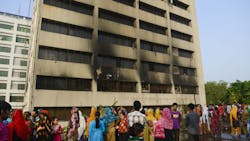New Bangladeshi Textile Disaster Leaves More Dead
DHAKA - A fire at a garment factory killed eight people Thursday in the latest disaster to hit Bangladesh's textile industry, still reeling from the death of more than 950 people in a building collapse.
The cause of the fire was not known, but authorities said it broke out during the night on the third floor of an 11-story building housing garment factories of the Tung Hai group in Dhaka's Darussalam district.
The Tung Hai's owner was among the victims, but there were no workers among the casualties since there was no overnight production, police and fire service officials said.
"It was a big fire but we managed to confine it on one floor," Mahbubur Rahman, operations director of the nation's fire service, told AFP.
He said the victims suffocated after rushing into a stairwell and becoming overwhelmed by toxic smoke from burnt acrylic clothing.
Local police chief Khalilur Rahman said the fire killed the owner, his four staff, a senior police officer, a low-level police official and an eighth person not yet identified.
Rahman said there were no workers in the factory when the blaze broke out sometime after 11.30 pm. "Only the owner, his staff and his friends were there on an upper floor," he said.
One of the victims was a mid-ranking member of the ruling Awami League party, police said.
National fire chief Ahmed Ali said the factory had the "roof-gate locked" but it had a fire license until June this year with fire safety measures found to be "satisfactory."
"The fire originated at the ironing section of the factory where there was a stockpile of acrylic sweaters. The burning of these sweaters created toxic carbon monoxide smoke, which then spread to the upper floors," Ali said.
"The eight people who died rushed to a gate leading onto the roof, but it was locked. They then tried to come downstairs but they were overwhelmed by toxic smoke in the stairwell."
One of Largest Garment Groups
Tung Hai is one of the country's largest garment groups with annual exports of around $200 million, according to the Bangladesh Garment Manufacturers and Exporters Association.
Tung Hai said on its Facebook page that British chain Primark was among its customers.
Spain's Inditex, whose labels include Zara, confirmed it had placed orders in the past but severed ties last June after Tung Hai's management "did not respond accordingly" to a plan to improve working conditions.
The fire comes as more bodies were found in the ruins of the nine-story Rana Plaza garment factory complex that caved in on April 24 when more than 3,000 workers were on shift.
Over 100 more bodies were recovered overnight, bringing the confirmed death toll to 953, according to the army.
Brigadier General Siddiqul Alam Sikder, overseeing the recovery operation, said he hoped to wrap up work on Friday and then leave bulldozers to shift the remaining rubble.
Bangladesh is the world's second-largest apparel maker and the $20 billion industry accounted for up to 80% of annual exports last year.
But it has a shocking safety record and Western retailers have been threatening to pull out unless authorities come up with a credible program to raise standards. Disney has already done so.
The government Wednesday announced the closure of 18 garment plants, days after it promised to give "the highest consideration" to safety after talks with the International Labor Organization.
Fire is a common problem in the 4,500 garment factories in Bangladesh, with many operations based in badly constructed buildings with sub-standard wiring.
In November, 111 people died after a fire engulfed the Tazreen Fashion factory outside Dhaka, the worst blaze in the history of the country's garment industry.
Around 700 people have been killed in garment factory fires in the country since 2006, according to the Amsterdam-based Clean Clothes Campaign group.
Western retailers have criticized the factories for not ensuring worker safety, but major brands continue to place orders and critics say they turn a blind eye to the endemic problems.
Shafiq Alam, AFP
Copyright Agence France-Presse, 2013
About the Author
Agence France-Presse
Copyright Agence France-Presse, 2002-2025. AFP text, photos, graphics and logos shall not be reproduced, published, broadcast, rewritten for broadcast or publication or redistributed directly or indirectly in any medium. AFP shall not be held liable for any delays, inaccuracies, errors or omissions in any AFP content, or for any actions taken in consequence.
